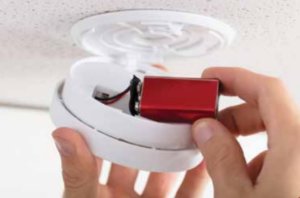Dec 21, 2018 | Homeowners
 Until recently, even the latest home security system could become obsolete overnight. But, newer whole-home integration systems are much more compatible with interchangeable parts and innovative add-ons. As a result, it’s now possible to have a multi-faceted security system that watches over many functions and activities in and around your home. For example, you can organize and control your home’s exterior cameras, motion detectors, door locks, window coverings, lighting, entertainment, appliances and HVAC with one system.
Until recently, even the latest home security system could become obsolete overnight. But, newer whole-home integration systems are much more compatible with interchangeable parts and innovative add-ons. As a result, it’s now possible to have a multi-faceted security system that watches over many functions and activities in and around your home. For example, you can organize and control your home’s exterior cameras, motion detectors, door locks, window coverings, lighting, entertainment, appliances and HVAC with one system.
If you’re buying an entirely new system at once, there are many established and emerging brands available, so consider their functions, cost, convenience and reliability. But, if you want to introduce a whole-home system to manage existing utilities and appliances, things can become more challenging. You will need to ensure that your specific devices can communicate with your new hub, which means you need to identify the protocol under which they can share information. Because their compatibility is not certain, it’s advisable to identify the make and model of your existing equipment before you purchase a new security hub or system.
Dec 17, 2018 | Homeowners
 It’s incumbent upon homeowners to ensure that fire safety is top-of-mind at all times. An all-encompassing approach should include steps for preventing, detecting, extinguishing and escaping potential fires. Prevention entails careful monitoring of any ignition procedure, whether it’s in the kitchen, utility room, workshop or garage, and ensuring that any active flame (or burning cigarette) is never left unattended. As well, prevention should include making fire-safe decisions when buying renovation materials, appliances, drapery, upholstery and mattresses.
It’s incumbent upon homeowners to ensure that fire safety is top-of-mind at all times. An all-encompassing approach should include steps for preventing, detecting, extinguishing and escaping potential fires. Prevention entails careful monitoring of any ignition procedure, whether it’s in the kitchen, utility room, workshop or garage, and ensuring that any active flame (or burning cigarette) is never left unattended. As well, prevention should include making fire-safe decisions when buying renovation materials, appliances, drapery, upholstery and mattresses.
As for detection, there are various types of alarms to consider. Be mindful that all battery-operated alarms should have their batteries replaced twice a year. Fire extinguishers, of course, can limit costly damage and prevent a small fire from getting out of control. Strategically place a fire extinguisher in key locations throughout your house. Be sure each extinguisher is designed for the type of fire it is designed to extinguish (i.e. A, B or C grade fires). As with all safety equipment, check that operational dates are not expired. If you’re ever unsure, invest in a new one.
Finally, every household member needs to know multiple exit paths in case of fire, especially from above or below the entrance level or ground floor. Be sure to designate a safe meeting area as part of your escape plan, and have a fire drill and/or conversation about it once a year.
Dec 7, 2018 | Real Estate 101
 Wouldn’t it be nice if you had all the time in the world to find your next dream home? You could leisurely browse the current listings, select homes you’d like to see, schedule visits on dates that are most convenient for you, and make an offer on a property only after you’ve had plenty of time to consider all the alternatives.
Wouldn’t it be nice if you had all the time in the world to find your next dream home? You could leisurely browse the current listings, select homes you’d like to see, schedule visits on dates that are most convenient for you, and make an offer on a property only after you’ve had plenty of time to consider all the alternatives.
Sure, that sometimes happens, but it’s not typical. Often, people shopping for a home are on a timeline. Sometimes a very tight timeline.
So how do you find your next dream home when you don’t have all the time in the world?
First, you need to develop a clear picture of the home you’re looking to buy:
- How many bedrooms?
- What size of property?
- What type of structure (two-story, split, etc…)?
Then, you need to list your preferences. These might include “large kitchen” or “main floor office”.
Now, this may pertain to sprawling urban centers more than small rural towns, but you should also narrow down the area in which you’d like to live. If you have three of four targeted areas, and only consider listings in those areas, your home search will be much faster.
What if you don’t know the neighbourhoods well? Visit a few. Drive around. Explore. Get as much beighbourhood data as possible, such as demographics, recreational activities, parks, shopping, schools, etc. Then choose the neighbourhoods that fit your lifestyle.
Finally, the best way to find a new home on a tight schedule is to work with the right real estate agent – someone who, like me, is experienced in the local market.
Contact me anytime!
Email Beth for more information
Nov 15, 2018 | Real Estate 101
 You’re shopping for a new home. You drive to visit a recent listing. As you walk through the front doors, you’re impressed. Every room looks fantastic. You see yourself relaxing on the spacious patio, cooking in the modern kitchen, and enjoying evenings with the family in the cozy living room.
You’re shopping for a new home. You drive to visit a recent listing. As you walk through the front doors, you’re impressed. Every room looks fantastic. You see yourself relaxing on the spacious patio, cooking in the modern kitchen, and enjoying evenings with the family in the cozy living room.
Your emotions are on overdrive.
This is your dream home! Should you make an offer? Probably. In fact, you should make that decision quickly in case there are other interested buyers.
However, your decision shouldn’t be guided purely by emotion. You want to make sure you take practical matters into consideration too.
For example, you’ll want to consider:
- Is the property within your price range?
- Does it have everything you need?
- Do you like the neighbourhood?
- How old is the property?
- Are there items, such as the furnace, that may need to be replaced soon?
- Will it need any major repairs or upgrades?
- What are the average monthly costs of carrying the home? (Property taxes, utilities, etc.)
Once you’ve considered the purchase of the home from a practical standpoint, you’ll have a lot more confidence in your decision when you make an offer.
Need help?
Email Beth for more information
Nov 13, 2018 | Real Estate 101
 When you’re having a garage sale, one of the toughest tasks is pricing your items. If you put a price tag on your old golf clubs that’s too high, no one will buy them. If you make the price too low, they might sell quickly, but you’ll spend the rest of the day wondering if you could have gotten more!
When you’re having a garage sale, one of the toughest tasks is pricing your items. If you put a price tag on your old golf clubs that’s too high, no one will buy them. If you make the price too low, they might sell quickly, but you’ll spend the rest of the day wondering if you could have gotten more!
It’s similar to selling your home — except with your home, the stakes are much higher. You want to price your property to sell, but you don’t want to leave any money on the table.
How do you accomplish that?
Setting the right list price for your home requires a combination of skilled calculation and industry savvy. Let’s start with the “calculation” part…
When you work with me, I’ll review recently sold properties that are similar to yours in type, size, features and location. Then, using that data, we’ll calculate a range that represents your property’s “current market value.”
For example, consider a spacious 15-year-old bungalow in a nice neighbourhood. If similar homes in the area have sold for $475,000-$550,000 in the last six months, then it’s obvious that your home should sell in that range too. A list price above or below that range would be in the danger zone.
But skilled calculation is only half the task.
Setting your list price also requires expertise in the local market, combined with good old-fashioned gut instinct. That instinct comes from being on the front lines of many property transactions.
That’s why working with a good real estate salesperson is so important, when you’re deciding on the list price for your home.
Want to discuss selling your home?
Contact Me
 Until recently, even the latest home security system could become obsolete overnight. But, newer whole-home integration systems are much more compatible with interchangeable parts and innovative add-ons. As a result, it’s now possible to have a multi-faceted security system that watches over many functions and activities in and around your home. For example, you can organize and control your home’s exterior cameras, motion detectors, door locks, window coverings, lighting, entertainment, appliances and HVAC with one system.
Until recently, even the latest home security system could become obsolete overnight. But, newer whole-home integration systems are much more compatible with interchangeable parts and innovative add-ons. As a result, it’s now possible to have a multi-faceted security system that watches over many functions and activities in and around your home. For example, you can organize and control your home’s exterior cameras, motion detectors, door locks, window coverings, lighting, entertainment, appliances and HVAC with one system.
 It’s incumbent upon homeowners to ensure that fire safety is top-of-mind at all times. An all-encompassing approach should include steps for preventing, detecting, extinguishing and escaping potential fires. Prevention entails careful monitoring of any ignition procedure, whether it’s in the kitchen, utility room, workshop or garage, and ensuring that any active flame (or burning cigarette) is never left unattended. As well, prevention should include making fire-safe decisions when buying renovation materials, appliances, drapery, upholstery and mattresses.
It’s incumbent upon homeowners to ensure that fire safety is top-of-mind at all times. An all-encompassing approach should include steps for preventing, detecting, extinguishing and escaping potential fires. Prevention entails careful monitoring of any ignition procedure, whether it’s in the kitchen, utility room, workshop or garage, and ensuring that any active flame (or burning cigarette) is never left unattended. As well, prevention should include making fire-safe decisions when buying renovation materials, appliances, drapery, upholstery and mattresses. Wouldn’t it be nice if you had all the time in the world to find your next dream home? You could leisurely browse the current listings, select homes you’d like to see, schedule visits on dates that are most convenient for you, and make an offer on a property only after you’ve had plenty of time to consider all the alternatives.
Wouldn’t it be nice if you had all the time in the world to find your next dream home? You could leisurely browse the current listings, select homes you’d like to see, schedule visits on dates that are most convenient for you, and make an offer on a property only after you’ve had plenty of time to consider all the alternatives. You’re shopping for a new home. You drive to visit a recent listing. As you walk through the front doors, you’re impressed. Every room looks fantastic. You see yourself relaxing on the spacious patio, cooking in the modern kitchen, and enjoying evenings with the family in the cozy living room.
You’re shopping for a new home. You drive to visit a recent listing. As you walk through the front doors, you’re impressed. Every room looks fantastic. You see yourself relaxing on the spacious patio, cooking in the modern kitchen, and enjoying evenings with the family in the cozy living room. When you’re having a garage sale, one of the toughest tasks is pricing your items. If you put a price tag on your old golf clubs that’s too high, no one will buy them. If you make the price too low, they might sell quickly, but you’ll spend the rest of the day wondering if you could have gotten more!
When you’re having a garage sale, one of the toughest tasks is pricing your items. If you put a price tag on your old golf clubs that’s too high, no one will buy them. If you make the price too low, they might sell quickly, but you’ll spend the rest of the day wondering if you could have gotten more!